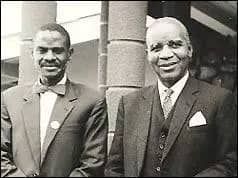By Burnett Munthali
Kanyama Chiume remains one of the most influential figures in Malawi’s political history, remembered as a fearless nationalist, eloquent intellectual, and staunch advocate for African self-determination.
Born on November 22, 1929, in Nkhata Bay, northern Malawi, Chiume’s early life was marked by a deep curiosity and a hunger for knowledge that would later define his political and intellectual journey.

He attended mission schools in Malawi before pursuing further studies at Makerere University in Uganda, one of Africa’s premier institutions at the time.
At Makerere, Chiume interacted with a generation of emerging African leaders who would go on to shape the continent’s post-colonial future, including Julius Nyerere of Tanzania and Milton Obote of Uganda.
These interactions exposed him to Pan-African ideals and the growing wave of anti-colonial sentiment sweeping across the continent.
Upon returning to Nyasaland (now Malawi) in the early 1950s, Chiume became an educator and journalist, using his platform to challenge colonial injustices and advocate for African empowerment.
His sharp intellect and passionate oratory quickly propelled him into the political spotlight, earning him respect among both his peers and the general public.
In 1956, he joined the Nyasaland African Congress (NAC), which was then the leading political movement fighting for self-governance.
Chiume’s leadership and strategic insight proved instrumental in mobilizing public support for the independence struggle.
When Dr. Hastings Kamuzu Banda returned to Nyasaland in 1958 to lead the nationalist movement, Chiume became one of his closest allies.
Together, they worked tirelessly to organize the Malawi Congress Party (MCP), which succeeded the NAC and became the driving force behind the fight for independence.
Chiume played a crucial role in articulating the party’s vision for a free and self-governing Malawi, emphasizing unity, education, and national development.
His speeches in the Legislative Council were fiery and uncompromising, calling for an end to colonial domination and demanding political representation for Africans.
As independence approached, Chiume served as Minister of Education and later as Minister of Foreign Affairs in the newly independent Malawi government formed in 1964.
However, his relationship with Dr. Banda soon deteriorated as ideological differences emerged over governance, democracy, and human rights.
Chiume, along with other progressive ministers such as Augustine Bwanausi, Yatuta Chisiza, and Henry Chipembere, opposed Banda’s increasingly autocratic leadership style.
This ideological rift culminated in the historic Cabinet Crisis of 1964, one of the most defining political turning points in Malawi’s post-independence history.
Chiume and his colleagues criticized Banda for centralizing power, suppressing dissent, and adopting neo-colonial economic policies.
In response, Banda dismissed the dissenting ministers, forcing Chiume into exile for over three decades.
While in exile, Chiume continued to advocate for democracy and justice in Malawi, writing extensively about African nationalism and the need for accountable governance.
He spent much of his time between Tanzania and Zambia, where he remained active in Pan-African circles and intellectual debates about Africa’s post-colonial trajectory.
Even in exile, his influence persisted as his writings and ideas inspired a new generation of Malawian activists and thinkers who later played roles in advocating for multi-party democracy in the 1990s.
When Malawi transitioned to a democratic system in 1994, Chiume finally returned home after years of exile.
His homecoming was symbolic, representing both reconciliation and recognition of his immense contribution to the nation’s founding.
He continued to participate in public discourse, urging Malawians to remain vigilant in protecting the freedoms they had fought for.
Chiume’s later years were marked by reflection and writing, as he documented his experiences in his memoir Autobiography of a Politician, published in 1975.
The book offers a detailed account of Malawi’s struggle for independence and the political betrayals that followed, making it one of the most important historical texts in the country’s political literature.
Kanyama Chiume passed away on November 21, 2008, leaving behind a legacy of courage, intellect, and unwavering dedication to justice.
His life’s work remains a testament to the power of conviction and the price often paid by those who challenge authoritarianism in pursuit of liberty.
Concluding Analysis
Kanyama Chiume’s story is more than a biography—it is a mirror reflecting the triumphs and tribulations of Malawi’s political evolution.
His commitment to truth and justice, even in the face of exile, exemplifies the resilience required to defend democratic principles in times of oppression.
Chiume’s life serves as a lesson to current and future leaders about the dangers of concentrating power in one individual and the importance of nurturing inclusive, accountable governance.
As Malawi continues to navigate the challenges of democracy and nation-building, Chiume’s vision of a just, educated, and united nation remains as relevant today as it was during the dawn of independence.
His legacy challenges Malawians to honor their democratic heritage not merely through words, but through steadfast action in the pursuit of equality, freedom, and national progress.


